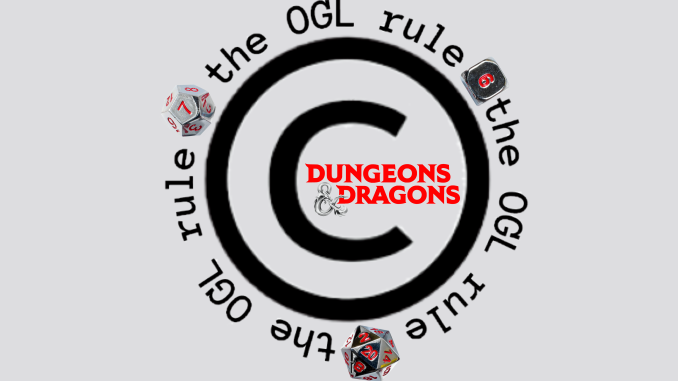
Shea Stevenson
Hasbro, parent company of “Dungeons & Dragons,” was recently revealed via a leaked document to be planning on doubling back on something called the “open gaming license,” or OGL. The OGL is a legal statement that basically allows anyone to use D&D names, rules, and other features in their own published products and make money off of those products with impunity. It’s been around in one form or another since 2000, and Hasbro wanted to replace it with anything that gives them more control and higher profits.
After this document was leaked earlier this month, the entire D&D community went into an uproar. I couldn’t kick a rock without it landing on the same hot take that changing the OGL was bad. That’s for good reason; it was bad. As of right now, Hasbro has double doubled back and is instead further reinforcing the OGL, even moving the rules into the Creative Commons. How nice.
This was only after there were mass unsubscriptions from D&D apps and publications, an immense push to just find and play different games, and more. In other words, only when it became clear that this would cost Hasbro more money than it might make them, they backed off. Good on the community. But if you take a step back for a moment and reappraise this situation… you might wonder what they have to be so angry about? After all, in any other medium, to have the biggest franchise of all time, be totally free to riff on, and make products for would be unthinkable! Imagine if anyone could make and release a game and declare it associated with “Call Of Duty,” up to and including using its assets and gameplay? “Call Of Duty: Killing Kennedy” could hit local game store shelves. Investors would not be happy.
But that also asks the question: where is “Dungeons & Dragons: Killing Kennedy?” In other words, if people have been free to go stupid wild on these rules for twenty-three years, what have they been doing with that freedom? If it’s so dangerous for brands to be open like that, why is D&D seemingly unscathed by it?
First, it’s worth mentioning that while you can use the rules and all as a base, you can’t literally copy and paste the words. You can say “this uses the core D&D rules” and refer back to them, but it’s not a case of people simply reprinting the books that make up the game of D&D.
That being said, people have been making cool stuff. Helpful stuff that they use to run and play the game themselves, or just things they think would be neat. Sure, there are gag products and lots of bad stuff, but people just don’t tend to buy those, so they’re not very popular. Popular products are usually things like entire additional rulebooks. Things with an incredible amount of intelligence and heart poured into their creation, the sorts of products a company would spend years and big money to produce, and it’s being added to their game at no cost to them.
This, among other things, has been D&D’s secret elixir of longevity; if you don’t like the base rules, don’t worry, there’s more where those came from. Don’t like any of the starting classes? There are tens of thousands more, of varying quality, but there’s bound to be something you like. While only releasing a new edition once or twice a decade, D&D manages to stay fresh for a vast majority of people who play because of artists and creators whose livelihoods are in some cases built off of just adding stuff to D&D.
So, really, “what do these people have to be angry about?” is not the question. The question is “why aren’t we more angry that this isn’t the normal way things work?” The copyright system in America and why it works the way it does is complicated, and outside of the purview of this piece, but suffice it to say that large organizations would like to have as much control over their own advertising, marketing, and products as possible. Copyright in America is entrenched in the idea of personal property. You thought of it, you own it, no one can touch it unless you say so.
This is sold to us as something that bolsters creative freedom and allows anyone to rise to the top if their ideas are good enough, protected by the law from imitators. The opposite seems to be the case.
